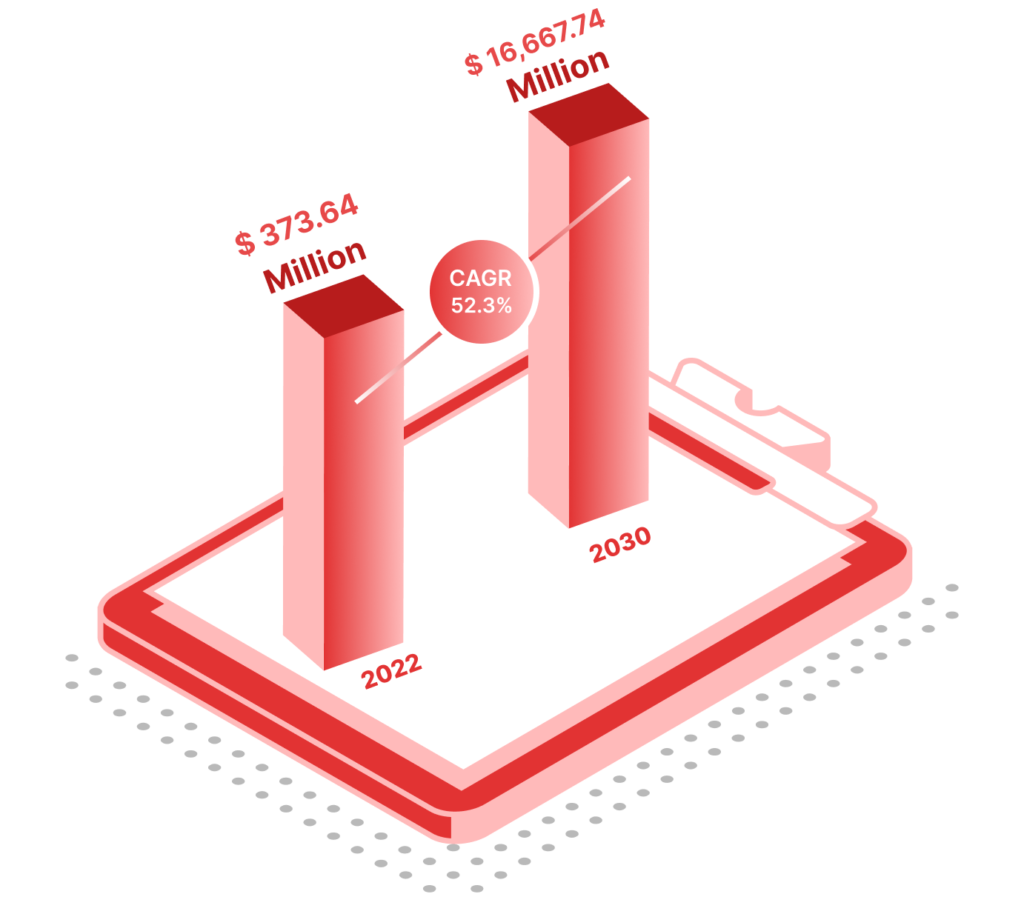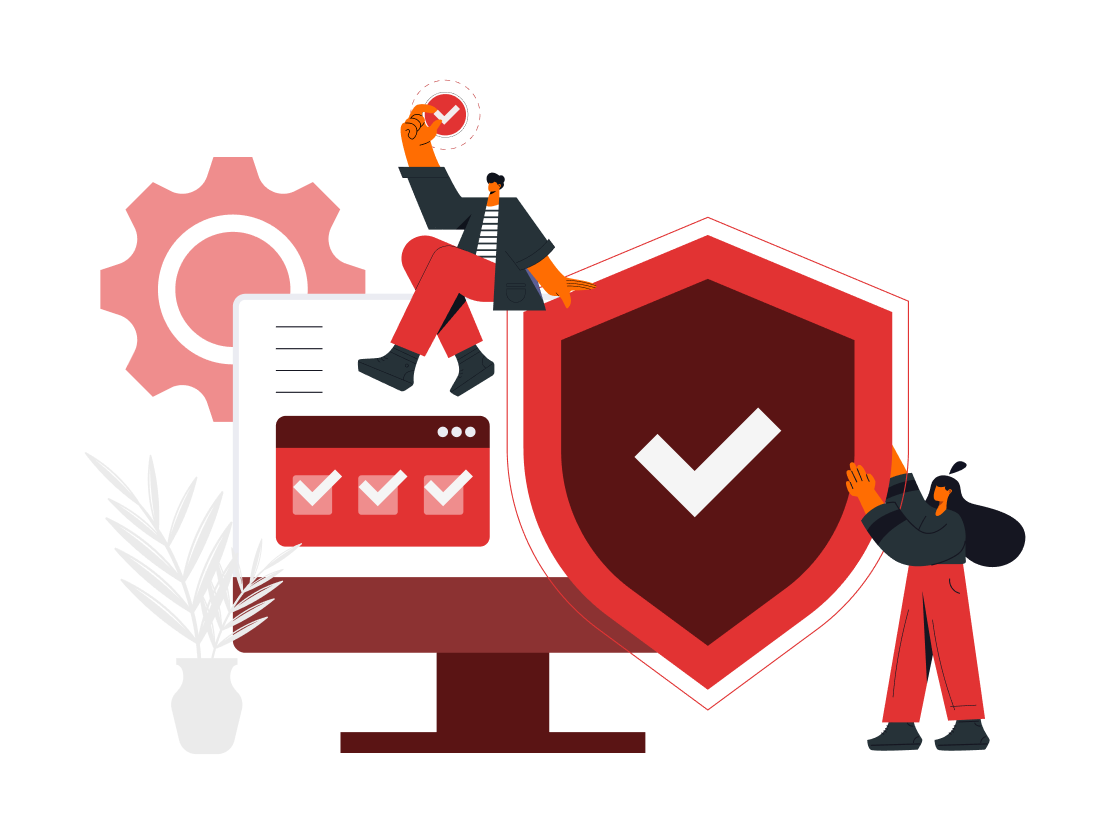Blockchain Supply Chain Market Trends
The blockchain supply chain market was estimated to be worth USD 373.64 million in 2021 and is anticipated to rise to USD 16,667.74 million by 2030, at a CAGR of 52.3% from 2023 to 2030. In today’s interconnected world, businesses face unprecedented challenges in managing supply chain operations efficiently while maintaining transparency and security. Blockchain in supply chain management offers a revolutionary solution, introducing a decentralized, immutable ledger that brings transparency, traceability, and trust to every step of the supply chain process. Blockchain in supply chain management offers a revolutionary solution, introducing a decentralized, immutable ledger that brings transparency, traceability, and trust to every step of the supply chain process.

The major factors fueling the blockchain supply chain market include increasing popularity of blockchain technology in retail and SCM, growing need for supply chain transparency and rising demand for enhanced security of supply chain transactions. Furthermore, the market is expected to experience significant growth opportunities during the projected period due to the rising demand for blockchain technology to automate data storage in digital formats. Nevertheless, the market's growth might be impeded throughout the forecast period as a result of limited awareness about blockchain technology. At SoluLab, we are dedicated to empowering supply chain & logistics businesses with our innovative blockchain technology solutions that streamline operations, enhance security, and boost overall efficiency. Explore the transformational potential of blockchain in logistics and supply chain with our cutting-edge technology at SoluLab.
Blockchain Supply Chain Market Trends
The blockchain supply chain market was estimated to be worth USD 373.64 million in 2021 and is anticipated to rise to USD 16,667.74 million by 2030, at a CAGR of 52.3% from 2023 to 2030. In today’s interconnected world, businesses face unprecedented challenges in managing supply chain operations efficiently while maintaining transparency and security. Blockchain in supply chain management offers a revolutionary solution, introducing a decentralized, immutable ledger that brings transparency, traceability, and trust to every step of the supply chain process. Blockchain in supply chain management offers a revolutionary solution, introducing a decentralized, immutable ledger that brings transparency, traceability, and trust to every step of the supply chain process.

The major factors fueling the blockchain supply chain market include increasing popularity of blockchain technology in retail and SCM, growing need for supply chain transparency and rising demand for enhanced security of supply chain transactions. Furthermore, the market is expected to experience significant growth opportunities during the projected period due to the rising demand for blockchain technology to automate data storage in digital formats. Nevertheless, the market's growth might be impeded throughout the forecast period as a result of limited awareness about blockchain technology. At SoluLab, we are dedicated to empowering supply chain & logistics businesses with our innovative blockchain technology solutions that streamline operations, enhance security, and boost overall efficiency. Explore the transformational potential of blockchain in logistics and supply chain with our cutting-edge technology at SoluLab.
Use Cases Of Blockchain In Supply Chain And Logistics
One of the most popular applications of blockchain technology is supply chain traceability. Distributed ledger technology might boost trade volume by 15% and US GDP by up to 5% by taking the place of the current systems. Unlock the potential of this revolutionary technology by reading about the compelling use cases that show how blockchain is utilized in logistics and supply chain.
Product Traceability
Blockchain enables seamless product traceability by recording each step of the supply chain journey. From raw material sourcing to final delivery, businesses can track and authenticate products, ensuring transparency and reducing the risk of counterfeiting.
Inventory Management
With blockchain's current monitoring features, businesses can optimize inventory management. Having accurate data on stock levels allows for efficient stock replenishment and minimized carrying costs.
Supplier Verification
Blockchain facilitates secure and verified supplier data storage. By maintaining a decentralized record of supplier credentials and compliance, companies can ensure they engage with reliable and compliant partners.

Smart Contract-enabled Payments
Smart contracts automate the payment processes upon meeting predefined conditions. This automatically streamlines financial transactions and reduces delays.
Sustainable Practices Verification
Blockchain helps to validate and verify sustainable practices across the supply chain. It fosters greater consumer confidence among environmentally conscious customers by using its immutable and transparent features, driving firms to embrace eco-friendly initiatives.
Reducing Fraud and Theft
Blockchain's decentralized and tamper-resistant nature helps prevent fraud and theft in the supply chain. This enhances trust among stakeholders and minimizes the risk of unauthorized alterations to records.
Use Cases of Blockchain in Supply Chain and Logistics
One of the most popular applications of blockchain technology is supply chain traceability. Distributed ledger technology might boost trade volume by 15% and US GDP by up to 5% by taking the place of the current systems. Unlock the potential of this revolutionary technology by reading about the compelling use cases that show how blockchain is utilized in logistics and supply chain.
Product Traceability
Blockchain enables seamless product traceability by recording each step of the supply chain journey. From raw material sourcing to final delivery, businesses can track and authenticate products, ensuring transparency and reducing the risk of counterfeiting.
Inventory Management
With blockchain's current monitoring features, businesses can optimize inventory management. Having accurate data on stock levels allows for efficient stock replenishment and minimized carrying costs.
Supplier Verification
Blockchain facilitates secure and verified supplier data storage. By maintaining a decentralized record of supplier credentials and compliance, companies can ensure they engage with reliable and compliant partners.

Smart Contract-enabled Payments
Smart contracts automate the payment processes upon meeting predefined conditions. This automatically streamlines financial transactions and reduces delays.
Sustainable Practices Verification
Blockchain helps to validate and verify sustainable practices across the supply chain. It fosters greater consumer confidence among environmentally conscious customers by using its immutable and transparent features, driving firms to embrace eco-friendly initiatives.
Reducing Fraud and Theft
Blockchain's decentralized and tamper-resistant nature helps prevent fraud and theft in the supply chain. This enhances trust among stakeholders and minimizes the risk of unauthorized alterations to records.
Key Challenges in Implementing Blockchain for Supply Chain & Logistics
As the supply chain and logistics industry embraces the transformative prospectives of blockchain technology, several challenges emerge on the path to seamless integration. From integration complexities to data privacy concerns, these obstacles demand strategic processes and industry-wide collaboration to drive successful blockchain implementations. Let’s delve into the key challenges that businesses encounter when adopting blockchain.
Integration with Existing Systems
Integrating blockchain into established supply chain and logistics systems can be complex and time-consuming, leading to resistance from stakeholders.
Data Privacy and Confidentiality
Supply chain data often involves sensitive business information, and ensuring data privacy while maintaining transparency is crucial.
Scalability for Large Networks
As supply chains involve numerous participants and a vast amount of data, scalability becomes a major concern for blockchain networks.
Standardization and Interoperability
Supply chain networks contain various partners with disparate technology infrastructures, making standardization and interoperability difficult to achieve.
Adoption and Collaboration
Convincing all partners within a supply chain ecosystem to adopt blockchain technology and collaborate on a shared platform can be a considerable challenge.
Cost and Resource Constraints
Implementing blockchain strategies can require substantial financial investments and technical expertise, posing a barrier for some businesses.
Key Challenges in Implementing Blockchain for Supply Chain & Logistics
As the supply chain and logistics industry embraces the transformative prospectives of blockchain technology, several challenges emerge on the path to seamless integration. From integration complexities to data privacy concerns, these obstacles demand strategic processes and industry-wide collaboration to drive successful blockchain implementations. Let’s delve into the key challenges that businesses encounter when adopting blockchain.
Integration with Existing Systems
Integrating blockchain into established supply chain and logistics systems can be complex and time-consuming, leading to resistance from stakeholders.
Data Privacy and Confidentiality
Supply chain data often involves sensitive business information, and ensuring data privacy while maintaining transparency is crucial.
Scalability for Large Networks
As supply chains involve numerous participants and a vast amount of data, scalability becomes a major concern for blockchain networks.
Standardization and Interoperability
Supply chain networks contain various partners with disparate technology infrastructures, making standardization and interoperability difficult to achieve.
Adoption and Collaboration
Convincing all partners within a supply chain ecosystem to adopt blockchain technology and collaborate on a shared platform can be a considerable challenge.
Cost and Resource Constraints
Implementing blockchain strategies can require substantial financial investments and technical expertise, posing a barrier for some businesses.
How SoluLab Added Value by Overcoming These Industry Challenges?
SoluLab’s cutting-edge blockchain innovations have significantly transformed the supply chain and logistics industry by nearly 70%, adding immense value through:

Enhanced Transparency and Traceability by 47%
Blockchain ensures unparalleled transparency by recording every transaction and movement of goods in a decentralized manner. At SoluLab, we have developed flexible and modular blockchain solutions for various companies that can seamlessly integrate with existing systems, minimizing disruptions and providing enhanced transparency and traceability by 47%.
Boosting Cost Savings
Traditional supply chain processes involve multiple intermediaries, such as banks, customs brokers, and third-party logistics providers, which add several costs and complexities. With our solutions, our clients are estimated to save over a billion dollars in annual costs by 2025 globally.


Improved Security Measures by 60%
In a joint report by PwC and VeChain, it was found that blockchain implementation in the supply chain can reduce the risk of counterfeit products by up to 20%. Our team of specialists improved supply chain network security by 60% while enabling only authorized parties to view certain data.
Increased Real-Time Tracking and Visibility by 5x
With our blockchain services at SoluLab, gain increased real-time tracking and visibility of goods throughout the supply chain by 5 times. We monitored the movement and location of products at any given moment, enabling better inventory management and reducing the risk of stockouts.


Promotion of 100% Sustainability and Compliance
At SoluLab, blockchain promotes 100% sustainability and compliance by providing transparent proof of environmentally friendly practices to our partners. Additionally, the immutable nature of blockchain records simplifies compliance reporting, helping businesses adhere to industry regulations effortlessly.
Enabled 60% Reduction in Counterfeit Incidents
Counterfeit products pose a significant threat to industries worldwide, eroding consumer trust and causing substantial financial losses to businesses. At SoluLab, our team has made it possible for an amazing 60% reduction in counterfeit incidents by using the immutability and transparency built into blockchain technology.

How SoluLab Added Value by Overcoming These Industry Challenges?
SoluLab’s cutting-edge blockchain innovations have significantly transformed the supply chain and logistics industry by nearly 70%, adding immense value through:

Enhanced Transparency and Traceability by 47%
Blockchain ensures unparalleled transparency by recording every transaction and movement of goods in a decentralized manner. At SoluLab, we have developed flexible and modular blockchain solutions for various companies that can seamlessly integrate with existing systems, minimizing disruptions and providing enhanced transparency and traceability by 47%.
Boosting Cost Savings
Traditional supply chain processes involve multiple intermediaries, such as banks, customs brokers, and third-party logistics providers, which add several costs and complexities. With our solutions, our clients are estimated to save over a billion dollars in annual costs by 2025 globally.


Improved Security Measures by 60%
In a joint report by PwC and VeChain, it was found that blockchain implementation in the supply chain can reduce the risk of counterfeit products by up to 20%. Our team of specialists improved supply chain network security by 60% while enabling only authorized parties to view certain data.
Increased Real-Time Tracking and Visibility by 5x
With our blockchain services at SoluLab, gain increased real-time tracking and visibility of goods throughout the supply chain by 5 times. We monitored the movement and location of products at any given moment, enabling better inventory management and reducing the risk of stockouts.


Promotion of 100% Sustainability and Compliance
At SoluLab, blockchain promotes 100% sustainability and compliance by providing transparent proof of environmentally friendly practices to our partners. Additionally, the immutable nature of blockchain records simplifies compliance reporting, helping businesses adhere to industry regulations effortlessly.
Enabled 60% Reduction in Counterfeit Incidents
Counterfeit products pose a significant threat to industries worldwide, eroding consumer trust and causing substantial financial losses to businesses. At SoluLab, our team has made it possible for an amazing 60% reduction in counterfeit incidents by using the immutability and transparency built into blockchain technology.



